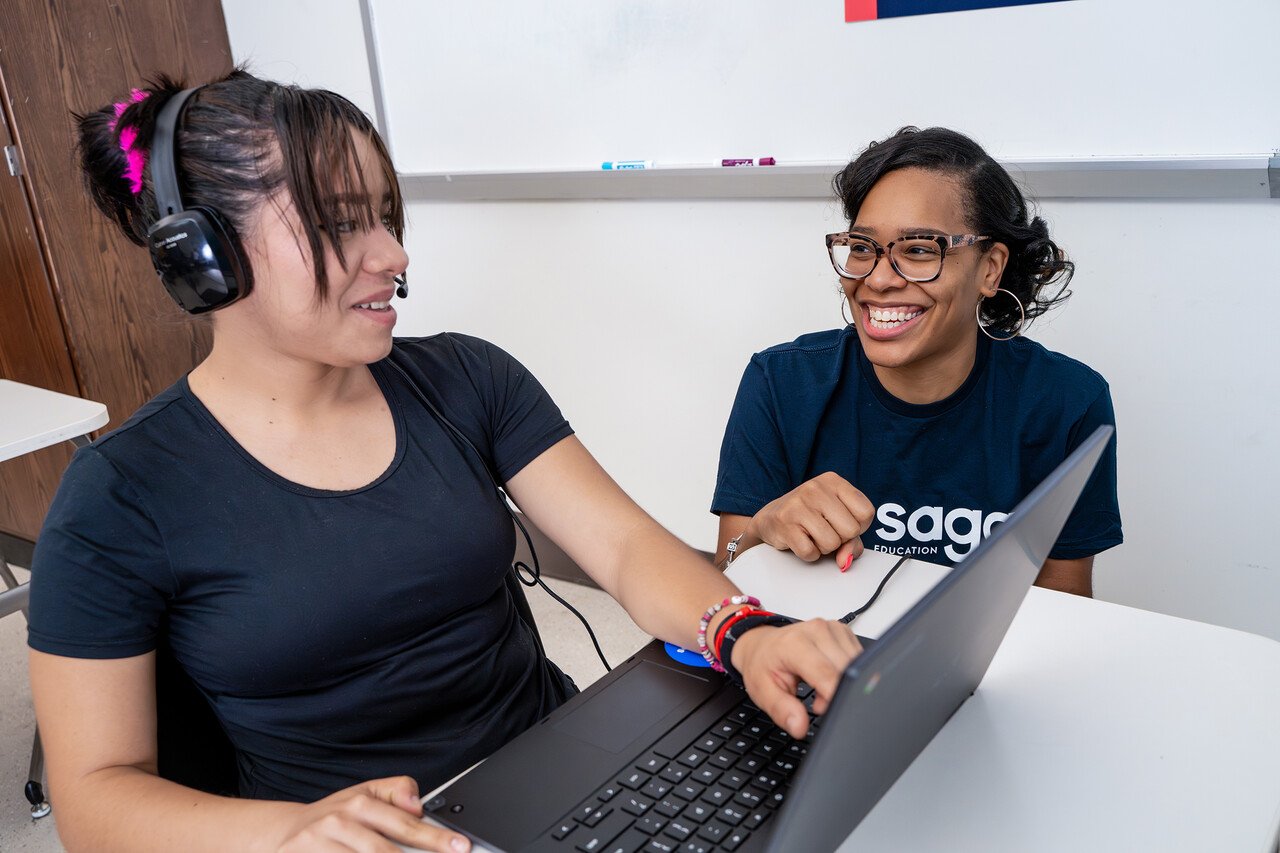Imagine you are a ninth-grade student who dislikes math. You struggle to keep up and, most often, simply tune out during class. The urban school district you attend has high rates of poverty and is under-resourced. This year, you are told that for a period during your regular school day, you are going to attend a new program called Math Lab. You will work with Denise, a tutor, all year long in a small group with two other students.
When you arrive at Math Lab, you sit with the other two students. Each of you opens your laptop and logs into a program called
Saga Connect. Denise is already online and waiting for you in the huddle space. You liked Denise from day one. She is kind and empathetic, and she seems genuinely interested in what you are thinking. Denise also listens to you and seems to know how to explain math in a way that makes it meaningful. You find yourself thinking maybe you are a math person after all.

This story illustrates an intervention called
high-impact tutoring, and it likely goes beyond what you typically think of when you think of tutoring. Like most high-impact tutors, Denise is a recent college graduate doing a year of service as part of the AmeriCorps program. Like others in the program, Denise is not an education specialist, but she was chosen, first and foremost, because she demonstrated an ability to deeply connect with math students.
Using AI to Create Equity in Learning
High-impact tutoring has been rigorously studied for effectiveness. Numerous
randomized studies have shown it to yield dramatic results in academic achievement and student self-confidence. In fact, there is not another intervention that comes close to its effect size for the cost of $1,300 per student per year.
You would not be alone in wondering why we don’t implement this in every school district across our nation. Well, it turns out that describing the intervention does not, in fact, make it easy to do well. There are a series of things school districts have to get right in order to get the outsized benefits.
At Saga Education, our mission is to scale our high-impact tutoring program for middle years math and early literacy throughout the nation. It is at these two periods in a student’s academic journey that high-impact tutoring has been found to have the greatest impact.
We are developing a number of
tools to help ensure that districts can implement high-impact tutoring programs with fidelity, and key to these resources is the use of AI. For decades, we have had predictable, programmatic solutions, but now we have a novel marriage of computation capabilities with language capabilities. That is an entirely new modality for technology.
There are four key ways that innovation with AI—and more specifically, natural language processing—can help implement a high-impact tutoring program:
- Identify and train non-education specialists to be great tutors.
- Provide real-time feedback and guidance to enhance the tutoring sessions.
- Recommend tasks based on student knowledge and interests.
- Develop independent learning pathways that are personalized and deeply engaging.
In order to harness AI and advanced technologies for these initiatives,
we are developing a hybrid human-AI tutoring platform in collaboration with UC Boulder’s AI Institute for Student-AI Teaming and generous funding from the NSF and Schmidt Futures.
This spring, we completed our first pilot of AI-generated feedback for tutors. Typically, we record every tutoring session. Afterward, our AI software analyzes the resulting voice transcription. Based on its findings, it can provide coaching to the tutors, such as identifying opportunities to check for understanding, ideas for asking probing questions instead of jumping to the answer, better conversation dynamics, and more effective pedagogical moves. It is remarkable in the depth and breadth of feedback. In fact, the quality of that feedback is as effective as an expert observer.
With the novel use of AI, we leverage the proven power of consistent coaching to help make non-education specialists great tutors. In the process, we help these instructors do what they do best: connect with students.
 |
Krista Marks is the Strategic Advisor (and former CTO) of Saga Education. In her role as CTO, Krista led the development of Saga’s software solutions to enable high-impact tutoring at scale. |
Discover how Saga Education Solutions uses technology to close the learning gap at your school or district.
About Us  This story illustrates an intervention called high-impact tutoring, and it likely goes beyond what you typically think of when you think of tutoring. Like most high-impact tutors, Denise is a recent college graduate doing a year of service as part of the AmeriCorps program. Like others in the program, Denise is not an education specialist, but she was chosen, first and foremost, because she demonstrated an ability to deeply connect with math students.
This story illustrates an intervention called high-impact tutoring, and it likely goes beyond what you typically think of when you think of tutoring. Like most high-impact tutors, Denise is a recent college graduate doing a year of service as part of the AmeriCorps program. Like others in the program, Denise is not an education specialist, but she was chosen, first and foremost, because she demonstrated an ability to deeply connect with math students.
 This story illustrates an intervention called high-impact tutoring, and it likely goes beyond what you typically think of when you think of tutoring. Like most high-impact tutors, Denise is a recent college graduate doing a year of service as part of the AmeriCorps program. Like others in the program, Denise is not an education specialist, but she was chosen, first and foremost, because she demonstrated an ability to deeply connect with math students.
This story illustrates an intervention called high-impact tutoring, and it likely goes beyond what you typically think of when you think of tutoring. Like most high-impact tutors, Denise is a recent college graduate doing a year of service as part of the AmeriCorps program. Like others in the program, Denise is not an education specialist, but she was chosen, first and foremost, because she demonstrated an ability to deeply connect with math students.

